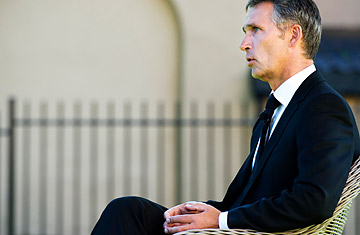
Norway's Prime minister Jens Stoltenberg is seen after a press conference at his residence on July 27, 2011.
(2 of 2)
In a culture where private emotions are usually kept private, Stoltenberg has given impassioned speeches over the past few days, often appearing close to tears, and hugged Oslo citizens. His spirited defense of Norway's democratic tradition in the face of the July 22 attacks has also won him sympathy from voters. In a public opinion poll published this week by the Oslo-based newspaper VG, 94% of Norwegians polled said Stoltenberg was doing his job "well" or "extremely well," scoring even higher than Norway's King Harald, who scored 76% approval. "It's seldom that anyone gets results that are as unambiguous as this," Anders Todal Jenssen, political scientist at Norway's technical university NTNU in Trondheim, told Norway's NRK television. Norwegian media are also reporting this week that all of the country's main political parties have seen a surge in membership.
Stoltenberg's popularity will allow him to retain control of the debate as it moves back to the policy arena in the coming weeks. Already he is preparing to propose heightened security measures. But there will be nothing that even resembles a U.S.-style Patriot Act or some of the anti-terror measures seen in the United Kingdom, Germany or France. Stoltenberg has created an independent commission to investigate the official response to the attacks and draw conclusions for security policy. Does that mean that Norwegian police will routinely carry firearms or that metal detectors will be installed in all public buildings? Not likely.
"Even if we had armed police, it wouldn't have changed a thing at Utoya or downtown Oslo," he says. "No society will ever be able to have security measures which gives you 100% security against violence, and especially not against what we believe was a one-man, lone wolf act of violence."
Stoltenberg is not the only Nordic politician who has fought the corsets of security commonly imposed on holders of public office in Western Europe and the United States. But that freedom has often carried a heavy price. In 1986, Swedish Prime Minister Olaf Palme was gunned down in the streets of Stockholm as he walked home from the movies with his wife and no bodyguards. In 2003, Swedish Foreign Minister Anna Lindh was stabbed to death while shopping in a department store.
Still, with the threat of Islamic terror growing and the arrests in Norway last year of three suspected terrorists, the country is imposing more security measures on its political leaders than ever before. The area where Breivik planted his car bomb, for example, was due to be sealed off to public traffic. "We were just in the process of closing this street because it goes between two government buildings," says Stoltenberg. "When I was prime minister in 2000 and 2001, there was hardly any security at all. I could just walk around Oslo without any body guards. Now I have security."
This security dilemma is hardly unique to Norway. Many countries today are faced with the question of how to hold firmly to democratic principles, civil liberties and freedom of movement even as those characteristics of societies make citizens more vulnerable to madmen. But Stoltenberg insists that you cannot compare Norway's experience with that of the United States in the aftermath of the Sept 11, 2001 attacks. "We are a tiny country," he says. And yet, who could argue when he says that the "response to violence is more democracy, more openness, and greater political participation."
